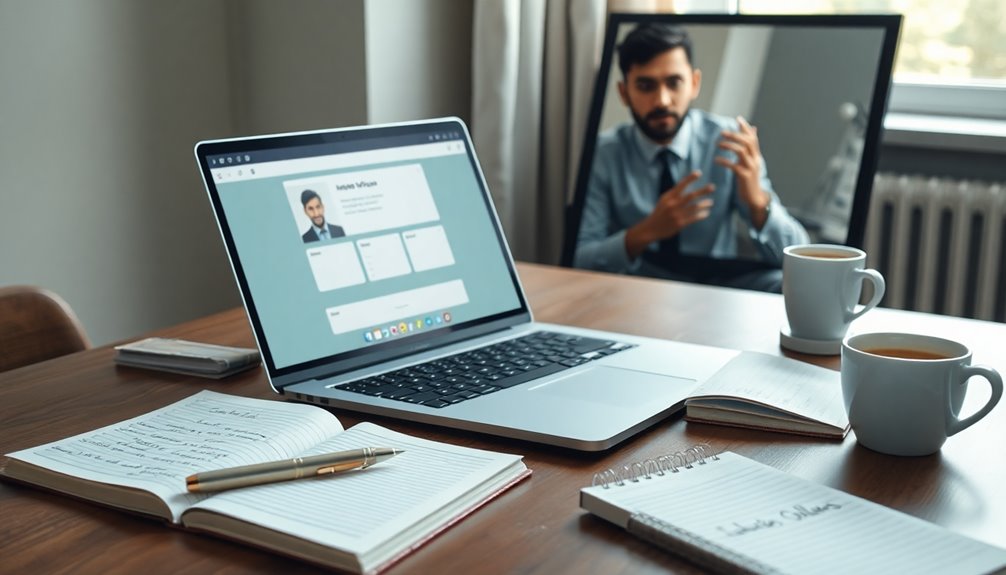Mastering competency-based interviews means you need to showcase your skills clearly. Start by using the STAR method—outline the Situation, Task, Action, and Result for each example you share. Research the company's values and tailor your responses accordingly. Anticipate various question types, from behavioral to situational, and practice your answers to boost your confidence. Don't forget to prepare diverse examples that highlight your adaptability, teamwork, and problem-solving abilities. Overcoming common pitfalls, like vague responses and nervousness, is essential. Stay tuned to discover more strategies that'll enhance your interview performance and impress potential employers.
Key Takeaways
- Utilize the STAR method to structure responses, ensuring clear examples for each competency relevant to the job.
- Research the company's values and align your answers to demonstrate cultural fit and understanding.
- Prepare diverse examples of past experiences that showcase key skills like teamwork, problem-solving, and adaptability.
- Conduct mock interviews to practice and refine your responses, boosting confidence and reducing anxiety.
- Follow up with a thank-you email post-interview, expressing gratitude and reiterating your interest in the position.
Understanding Competency-Based Interviews

How can understanding competency-based interviews enhance your chances of landing a job? By grasping this interview style, you can effectively showcase your past behavior as a predictor of future performance.
Competency-based interviews focus on your specific skills and experiences, allowing you to highlight competencies like teamwork, communication, problem-solving, and leadership.
When you understand what interviewers are looking for, you can tailor your responses to reflect the key competencies relevant to the job. This approach helps you provide concrete examples that demonstrate your abilities, making it easier for employers to see your fit for the role.
Ultimately, knowing how to navigate these interviews can greatly boost your confidence and improve your chances of success.
Importance of Interview Preparation

Effective interview preparation is a game changer when it comes to landing the job you want. By investing time in preparation, you'll boost your confidence and improve the quality of your responses.
Familiarizing yourself with common competency-based questions helps you articulate your fit for the role effectively. You'll also reduce anxiety, allowing you to focus on showcasing your skills and experiences.
Identifying key competencies that employers seek enables you to align your personal examples with their expectations. This structured approach not only enhances your performance but also demonstrates your commitment to the opportunity.
Types of Interview Questions

Understanding the types of interview questions you'll face is essential in your preparation process.
You'll encounter behavioral questions that ask you to describe past experiences, like handling difficult tasks or resolving conflicts.
Situational questions will challenge you to think on your feet, presenting hypothetical scenarios and asking how you'd respond.
You may also face motivational questions that assess your drive and passion for the role.
Teamwork-related questions can reveal your collaboration skills, while questions about achievements highlight your capacity for success.
Identifying Key Competencies

Identifying key competencies is essential for tailoring your interview preparation to align with what employers are seeking.
You'll want to pinpoint the specific skills that can set you apart.
Consider these three critical competencies:
- Teamwork: Employers value candidates who can collaborate effectively and contribute to group success.
- Problem-solving: Showcasing your ability to tackle challenges creatively can demonstrate your resourcefulness.
- Communication: Strong communication skills can convey your ideas clearly, helping you connect with colleagues and clients alike. Additionally, mental health benefits associated with effective teamwork can enhance overall workplace productivity.
Using the STAR Method

When you're preparing for competency-based interviews, the STAR method can be your best friend. This structured approach helps you present your experiences clearly and effectively.
Start by outlining the Situation, providing context for your story. Next, describe the Task, focusing on your specific responsibilities. Then, move on to the Action you took, detailing the steps you implemented to address the situation.
Finally, share the Result, emphasizing the outcomes and any lessons learned. Using the STAR method not only keeps your answers focused but also showcases your problem-solving skills.
Practice formulating responses using this technique, so you're ready to impress interviewers with compelling examples of your past experiences.
Common Interview Pitfalls

Many candidates fall into common interview pitfalls that can undermine their chances of success. To avoid these traps, keep an eye out for the following:
- Vague Responses: Not providing specific examples can make you seem unprepared or lacking experience.
- Inadequate Preparation: Failing to practice your answers can lead to stumbling or rambling during the interview.
- Nervousness: Becoming overly defensive or anxious can create a negative impression and hinder your ability to communicate effectively.
Recognizing these pitfalls is essential.
By steering clear of them, you'll present yourself as a confident and capable candidate, ready to demonstrate your skills and fit for the role.
Prepare well, stay calm, and remember—your experiences matter!
Tips for Interview Success

How can you guarantee a successful interview? Start by dressing appropriately for the setting and arriving early to gather your thoughts.
Engage actively with the interviewer by listening carefully and responding thoughtfully. Showcase your relevant competencies through specific examples, using the STAR method to structure your answers.
Maintain a positive attitude, even when discussing challenges, and be sure to highlight your problem-solving skills. Additionally, being self-aware can significantly enhance your interview performance by allowing you to understand and articulate your strengths more effectively.
After the interview, send a thank-you note to express your appreciation and reiterate your interest in the position. This simple gesture can leave a lasting impression.
Remember, preparation breeds confidence, so practice your responses beforehand to avoid being vague or defensive.
With these tips, you'll be well on your way to interview success.
Preparing for Remote Interviews

Preparing for remote interviews requires a different approach than traditional face-to-face meetings.
You'll want to verify that your technology is up to par and that you create a professional atmosphere. Here are three essential steps to help you succeed:
- Test your tech: Make sure your camera, microphone, and internet connection work flawlessly. A glitch can derail your interview and increase anxiety.
- Choose your space wisely: Find a quiet, well-lit location free from distractions to keep the focus on you.
- Dress the part: Even if you're at home, dressing professionally boosts your confidence and sets the right tone.
Essential Skills for Success

Success in any professional setting hinges on a few essential skills that can set you apart from the competition.
First, strong communication skills are crucial; they enable you to express ideas clearly and collaborate effectively.
Next, active listening enhances your understanding of others, fostering better teamwork.
Time management is another critical skill, allowing you to prioritize tasks and meet deadlines consistently.
Additionally, adaptability is essential in today's fast-paced environment; being open to change helps you navigate challenges smoothly.
Finally, problem-solving skills empower you to tackle obstacles creatively and decisively. Moreover, having a solid understanding of retirement savings plans can provide long-term financial security, which is vital for professional success.
Professional Development Opportunities

Professional development opportunities are essential for advancing your career and enhancing your skill set. Engaging in these activities not only boosts your confidence but also equips you with the tools needed to excel in competency-based interviews.
Here are three impactful options to explore:
- Workshops and Webinars: Participate in sessions that hone specific skills, like communication and problem-solving.
- Networking Events: Connect with industry professionals to gain insights and potential mentorship.
- Online Courses: Enroll in courses that align with your career goals, enhancing both technical and soft skills. Additionally, consider leveraging automation's role in business intelligence to enhance your analytical skills during interviews.
Frequently Asked Questions
How Do I Research the Company Before an Interview?
To research the company before your interview, start by exploring its website, focusing on the mission, values, and recent news.
Check social media profiles for updates and community engagement.
Read employee reviews on platforms like Glassdoor to understand company culture.
Also, look into industry trends and competitors.
What Should I Do if I Don't Have Relevant Experience?
If you think you're completely void of relevant experience, think again!
You've got skills and qualities that can shine even without a perfect match. Dig deep into your past—volunteer work, school projects, or personal challenges can showcase your abilities.
Highlight transferable skills like teamwork or problem-solving. Frame your stories to demonstrate how you're enthusiastic to learn and adapt.
Employers love a fresh perspective, so let your uniqueness steal the spotlight!
How Can I Effectively Follow up After the Interview?
After the interview, you can effectively follow up by sending a thank-you email within 24 hours.
Express your appreciation for the opportunity, reiterate your interest in the position, and briefly mention a key point from your conversation.
Keep it concise and professional. This not only shows your enthusiasm but also reinforces your suitability for the role.
A thoughtful follow-up can leave a positive impression on the interviewer.
What Should I Bring to the Interview?
When you head to an interview, bring a few essential items to make a great impression.
Have multiple copies of your resume handy, so you can share them easily. Don't forget a notepad and pen for taking notes or jotting down questions. A list of references can also be helpful.
Finally, carry a professional-looking folder to keep everything organized. This preparation shows you're serious and ready for the opportunity.
How Can I Manage Interview Anxiety?
Nervousness can gnaw at your confidence, but you can conquer it!
To manage interview anxiety, practice positive visualization—imagine yourself acing the interview. Prepare thoroughly, so you feel ready and resilient.
Breathe deeply before you enter, centering your mind. Arrive early to ease into the environment, and remember, it's a conversation, not an interrogation.
Focus on your strengths and experiences, and you'll shine, showcasing your true potential to the interviewer.
Conclusion
Steering through competency-based interviews is like sailing a ship through uncharted waters. With preparation as your sturdy vessel and the STAR method as your compass, you can chart a course toward success. By identifying key competencies and honing your essential skills, you build a robust crew to tackle any questions that arise. Embrace these strategies, and you'll not only weather the storm but also steer your career toward new horizons. Set sail with confidence, and make your mark!









